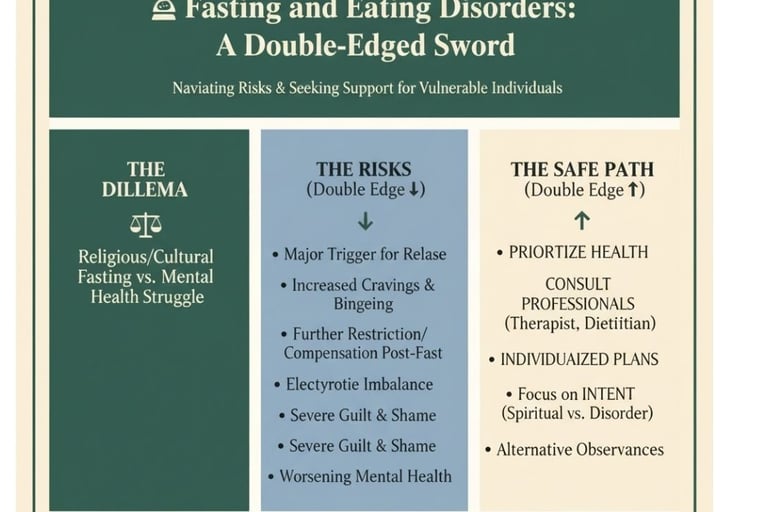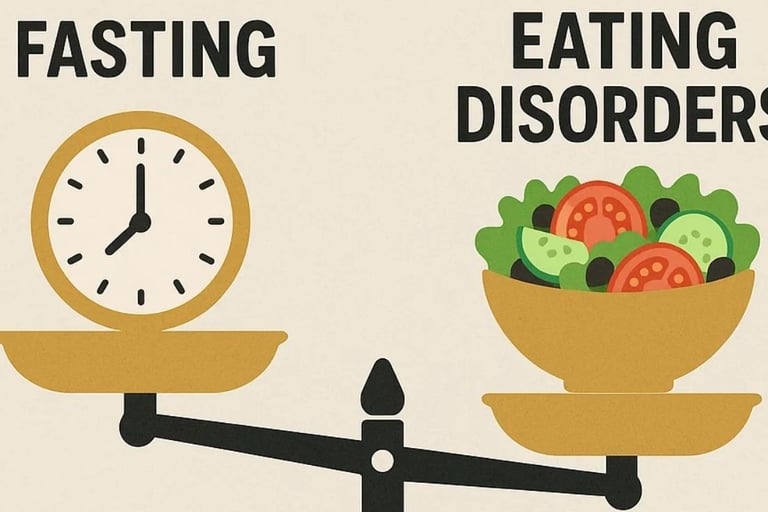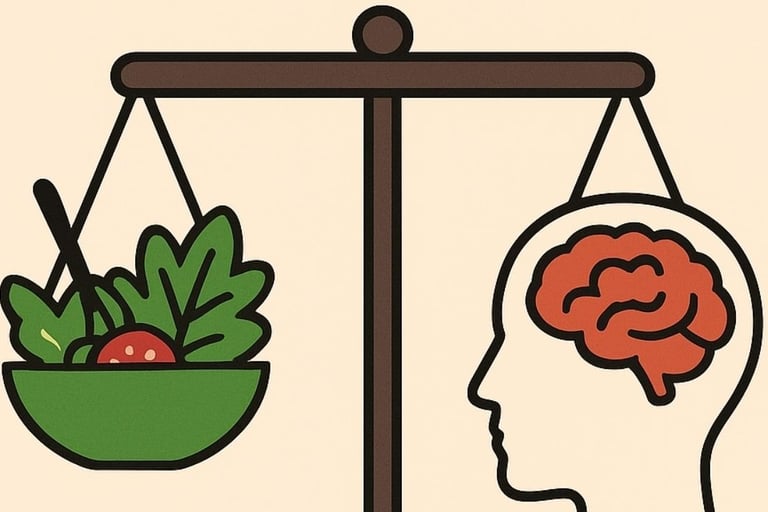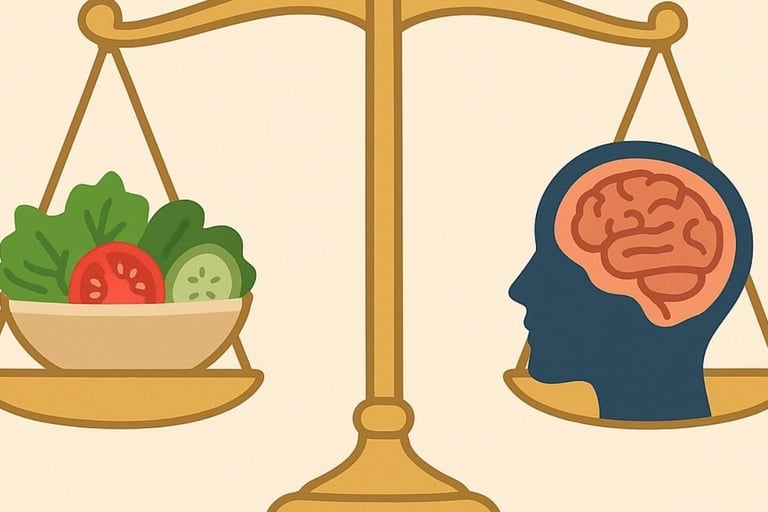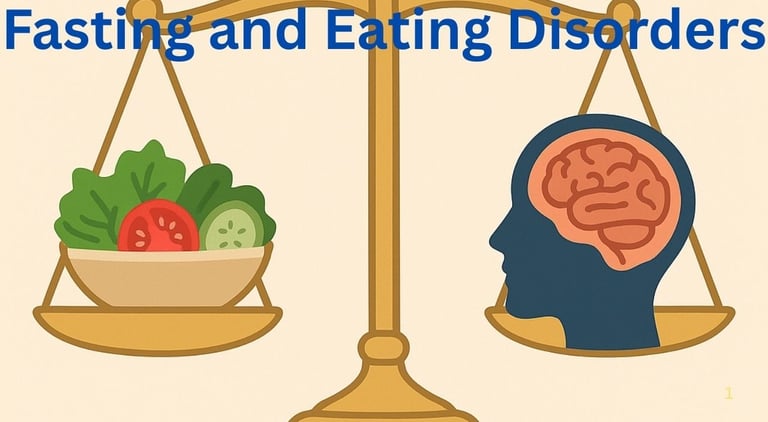
Health is a crown on the heads of the healthy that only the sick can see.
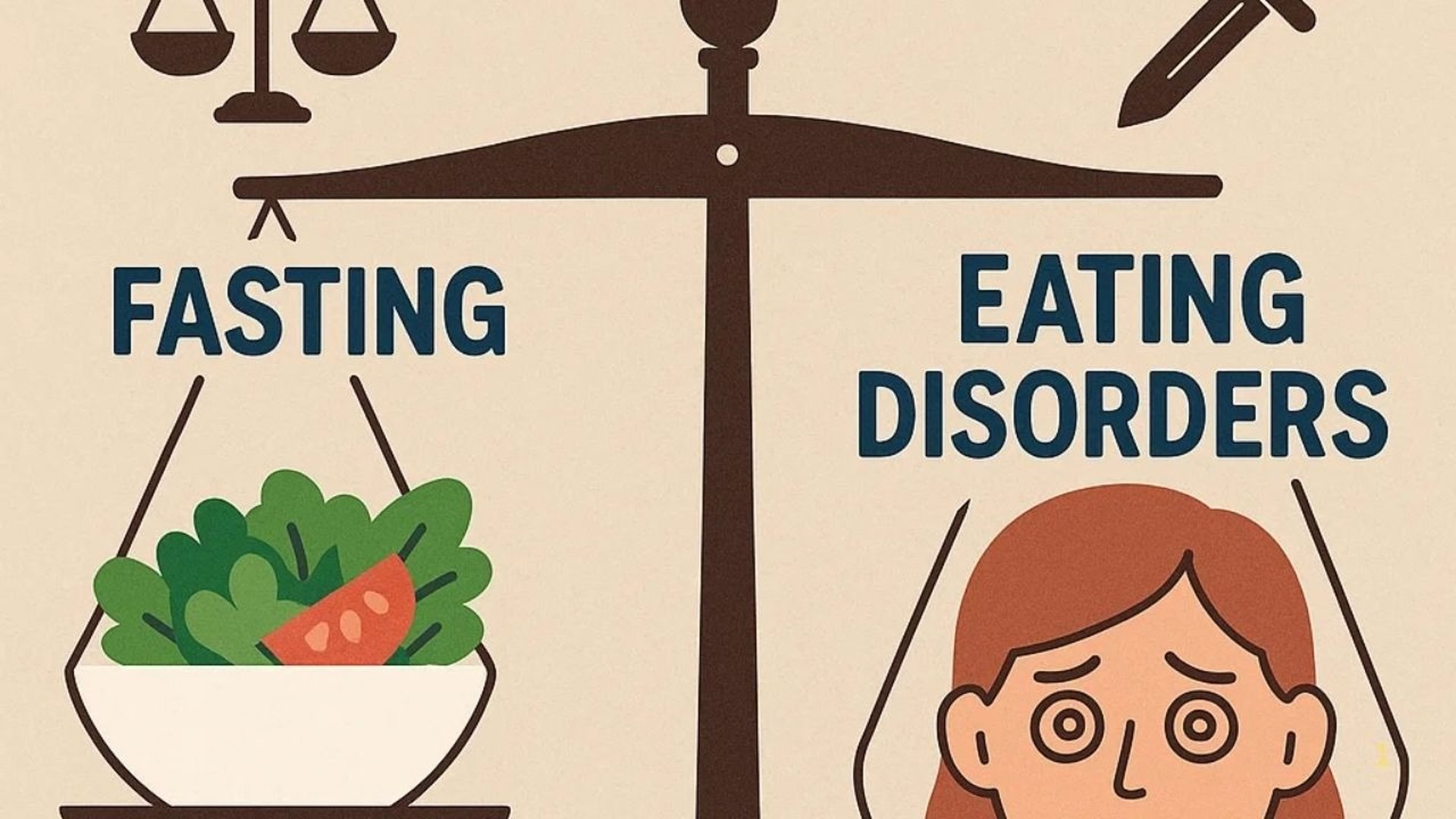
⚖️🥗 Fasting and Eating Disorders: A Double-Edged Sword🌙🧠
Blog post description.
FASTINGGASTROINTESTINAL
Dr Hassan Al Warraqi
9/23/20259 min read


⚖️🥗 Fasting and Eating Disorders: A Double-Edged Sword🌙🧠
⚖️🥗Discover complex relationship. how fasting can both benefit and harm individuals struggling with eating-related conditions.
Eating disorders are tough mental health problems.
They mess with how you see food, your body, and how you eat.
Let's look at some common ones, what their signs are, and how they connect to fasting (like during Ramadan or when you choose to fast).
This isn't meant to be a replacement for professional advice.
If you think you might have an eating disorder, please seek help from a qualified healthcare provider.
Common Eating Disorders and Their Signs
Eating disorders often mean you're super focused on food, eating, or your weight.
This can be bad for both your body and mind. Here are a few types:
Anorexia Nervosa
What it is: Really limiting how much you eat because you're scared of gaining weight and have a warped view of your body.
Signs:
* Losing a lot of weight
* Feeling tired and weak
* Hair getting brittle or falling out
* Trouble with your period
* Bones getting weak
Types:
Restricting: Losing weight by dieting, fasting, or working out too much.
Binge-eating/purging: Eating a lot or very little, then trying to get rid of the calories (throwing up, using laxatives, or exercising too much).
Keep in mind: You can still have anorexia even if you're not underweight.
Obsessive habits, like hoarding food or avoiding eating around others, are also common.
In serious cases, it can lead to organ failure or even death.
Bulimia Nervosa
What it is:Eating a lot of food in a short time (binging), then trying to get rid of the calories (purging).
Signs:
* Sore throat
* Swollen glands
* Enamel wear on your teeth, cavities
* Acid reflux, gut issues
* Being dehydrated, electrolyte problems
Purging: This can include throwing up, using laxatives or diuretics, fasting, or exercising too much.
Seriously, it may cause a stroke or heart attack because of electrolyte imbalances.
Binge-Eating Disorder (BED)
What it is: Eating a lot of food quickly and feeling like you can't stop, often secretly, but without purging.
Signs:
* Feeling guilty or ashamed after eating
* Eating when you're not hungry or until you're too full
* Higher chance of being obese, having diabetes, or heart disease
* Avoiding people
It's different from bulimia because you don't try to get rid of the calories.
Pica
What it is: Eating things that aren't food and have no nutritional value (like dirt, chalk, or soap).
Signs:
* Higher chance of getting poisoned, infected, or injured internally
* Not getting enough nutrients
It's more common in people with disabilities, autism, or schizophrenia.
It's only pica if it's not part of your culture or religion.
Depending on what you eat, it can be deadly.
Rumination Disorder
What it is: Throwing up food, chewing it again, and then swallowing it or spitting it out, usually within half an hour of eating.
Signs:
* Losing weight, not getting enough nutrients (especially in babies)
* Not wanting to eat in public (in adults)
It's common in babies (3–12 months) and often gets better on its own.
But older kids and adults might need therapy to treat it.
It can be deadly for babies if they don't get treatment because they won't get enough nutrients.
Avoidant/Restrictive Food Intake Disorder (ARFID)
What it is: Avoiding or restricting food because of how it feels (taste, texture, smell) or because you're scared of choking, not because you're worried about your weight.
Signs:
* Not eating enough calories or nutrients
* Losing weight, not growing well
* Not getting enough nutrients
* Having trouble socializing (like avoiding eating with others)
It's not the same as just being a picky eater, and it's not related to cultural or religious food rules.
Other Specified Feeding or Eating Disorder (OSFED)
Examples:
Purging Disorder: Purging even if you don't binge-eat
Night Eating Syndrome: Eating too much at night, often after waking up
Orthorexia: Being obsessed with eating healthy food, which can lead to not getting enough nutrients or avoiding people (it’s not officially in the DSM-5-TR yet)
Signs:
They vary, but they cause problems even if they don't fit perfectly into the other types of disorders.
Fasting and Eating Disorders
Fasting means not eating or drinking for a certain amount of time, whether it's for religious reasons (like Ramadan), cultural reasons, or to improve your health (like intermittent fasting).
While it can have meaning, it can be dangerous for people with eating disorders.
Here's what to keep in mind:
Risks of Fasting
Triggers Disordered Eating:
Anorexia: It can make you want to restrict food even more, which can lead to malnutrition and health problems.
Bulimia/BED: Fasting might start a binge-purge cycle or make you want to binge more because you're so hungry.
ARFID:It can make you avoid food even more.
Physical Health Risks:
* Not getting enough nutrients, being dehydrated, or having electrolyte imbalances (especially with bulimia).
* Higher chance of heart attack, stroke, or organ failure in serious cases.
What about Psychologically Risks?
* Thinking about food, weight, or your body all the time.
* Feeling guilty if you can't fast or if it goes against your recovery goals.
* Fasting might seem like an okay way to restrict food.
Fasting in Religious Contexts (like Ramadan)
Meaning: In Islam, fasting during Ramadan (from sunrise to sunset) helps you be more disciplined and connect with your community.
Who is Exempt : Islamic teachings say that people with health conditions, including eating disorders, don't have to fast.
They can donate to charity or make up the fasts later.
Challenges:
* Fasting during the day and eating at night (suhoor/iftar) can mess up healthy eating habits.
* You might feel pressured to fast, which can be stressful if you're trying to recover.
How to Participate Safely:
* Talk to your doctor and a religious leader to make sure you're taking care of both your spiritual and health needs.
* Eat balanced meals during non-fasting hours.
* Pay attention to your signs and make recovery a priority.
Fasting for Health (like Intermittent Fasting)
Risks:It can make restricting food seem normal; mess with your signs; or trigger binge-purge cycles.
If you Recover :It's not a good idea if you have an active eating disorder or are just starting to recover.
If you're doing better, intermittent fasting might help you eat more mindfully or help your metabolism, but you need to do it with a professional.
Potential Benefits (But Be Careful!)
If you are a Healthy People: Fasting might help with insulin sensitivity, metabolism, or mental clarity.
n Recovery (If you are Ready) Having a structured, supervised fasting might help you connect with mindful eating or your spirituality, but only after you're stable and with professional help.
How can you Manage Eating Disorders During Fasting
You need Professional Help:Talk to a doctor, therapist, or dietitian who knows about eating disorders before you start fasting.
Therapies like CBT or DBT can help with disordered thoughts and behaviors.
You have to Prioritize Recovery:If fasting triggers more issues, use religious exemptions.
Focus on eating intuitively and having regular meals when you're not fasting.
If you want to get Community and Spiritual Support: Connect with communities or religious leaders who understand what you're going through.
Talk about your needs so you don't feel pressured to fast.
Pay attention if you have Warning Signs:
* Thinking about food/weight all the time
* Physical signs (dizzy, tired, irregular heartbeat)
* Feeling down (guilty, anxious)
Takeaway
Eating disorders like anorexia nervosa, bulimia nervosa, binge-eating disorder, pica, rumination disorder, ARFID, and OSFED are serious and need professional help.
Fasting (like during Ramadan or intermittent fasting) can have important feelings, but it's risky for people with eating disorders.
It can cause symptoms to get worse.
Recovery should be the most important thing, and fasting should only be done with medical and spiritual guidance when you're stable.
Get support from professionals or groups like the National Eating Disorders Association (NEDA).
FAQs Frequently Asked Questions eating disorders
1. What are eating disorders, and why are they more than just food-related issues?
Eating disorders are mental health conditions that involve unhealthy relationships with food, body image, or weight.
They include anorexia nervosa, bulimia nervosa, binge-eating disorder (BED), pica, rumination disorder, avoidant/restrictive food intake disorder (ARFID), and other specified feeding or eating disorders (OSFED).
They often come from psychological things like low self-esteem, anxiety, or trauma and need medical and therapeutic help.
Dr. Hassan Alwarraqi Way of Fasting
Doing intermittent fasting with anorexia or bulimia ONLY considered under direct, continuous medical and therapeutic supervision after nutritional and psychological stabilization.
CRITICAL! You need stable Physical Health:
Weight-restored, stable vitals, no electrolyte imbalances and Psychological health: No active disordered behaviors, reduced food obsession, healthy coping skills in place and Full Team Approval: Get the approval of a psychiatrist, therapist, and dietitian.
🔬 Following are phases :
Phase 1: The Foundation and Regular Eating
Goal: This is all about establishing a pattern of meals and snacks without thinking feeling scared or anxious.
Focus: No fasting. This phase is about rebuilding trust with food and the body's signs.
All medications are continued as prescribed.
Phase 2: Medical Stabilization and Monitoring**Goal: You have to Ensure that the body can handle any changes without the need for medications.
You have to get treatment from a team.
Focus: Evaluate the patient's physical and mental state.
Review of maintenance of medication.
Phase 3: You have to plan Short Intervals
Goal: This phase is about introducing very short, planned fasting intervals in a therapeutic context and mindful of having no hunger.
Focus: This is not about weight loss.
Is a mindful exercise in experiencing hunger without fear, you have to rebuild with food Example: A 12 hours fasting or as a 7 PM to 7 AM you have to know that you are under guidance
Phase 4: Gradual Progression (You can achieve if the phase works) You have to extending the fasting is possible now!
IF the previous phase was non-triggering focus! The monitoring has to be done if any signs of relapse.
🚨 Red Flags: You have to Stop Immediately
* Experiencing obsessive thoughts on food
* experiencing any form of depression
remember: keep all medications as it begins slowly.
Medications are very important if you have other co-occurring conditions.
alternate day fasting David fasting 3-4 days per week.
KEY TAKEAWAY: This is all about healing your relationship with food.
2. What are the main signs of common eating disorders?
Anorexia Nervosa: Limiting food, fear of weight gain, not seeing your body as it is, weight loss, brittle hair/nails, fatigue, trouble with your period.
Bulimia Nervosa: Binge eating and then purging (throwing up, laxatives, excessive exercise), sore throat, tooth problems, electrolyte issues.
Binge-Eating Disorder (BED): Eating a lot without control, feeling guilty, being obese, higher chance of diabetes/heart disease.
Pica: Eating things that aren't food (like dirt or chalk), which can cause poisoning or gut injuries.
Rumination Disorder: Regurgitating and re-chewing food, not getting enough nutrients, losing weight.
ARFID: Avoiding food because of how it feels or fear of choking, not getting enough nutrients, not growing well.
OSFED: Having symptoms that don't fit neatly into other boxes, like purging without bingeing or obsessively eating “healthy” food (orthorexia).
3. How does fasting affect people with eating disorders?
Fasting, like during Ramadan or intermittent fasting, can be risky:
Anorexia: Might make you restrict even more, leading to not eating enough.
Bulimia/BED: Can cause binge-purge cycles or make you want to binge more.
ARFID: Might make you avoid food.
Risks: Not getting enough nutrients, being dehydrated, electrolyte imbalances, or thinking about food all the time.
Professional Guidance : Supervised Fasting may Support for mindful eating or religious.
4. Is intermittent fasting safe for people with eating disorders?
Intermittent fasting (like 16:8 or 5:2 methods) is mostly not recommendable those with eating disorders.
It can normalize cues and trigger cycles.
You have to consider recovery if you are considering supervised fasting, prioritize your recovery, and avoid a disordered eating.
5. How can someone with an eating disorder manage fasting?
Talk to Professiona:
l You have to consult and make sure that the dietitian or doctor specializes on such and not the other way.
You have to Prioritize: Consult and focus on you when you are outside of your time
If you feel dizzy then consult professional: Engage with communities for alternative ways.
6. Where can I find help for eating disorders?
Healthcare:Therapists, dietitians, or doctors specializing in eating disorders.
Support Organizations: Eating Disorders Association or Therapy!
7. What are the risks of untreated eating disorders?
Physical:Not eating well, heart a heart attack, stroke, infertility.
Psychological:Having anxiety, depression, social isolation.
Social: Relationships suffering.
—------------------------------------------------------------
====================================
Fasting may offer health benefits, but for those with eating disorders, it can become a dangerous trigger. Explore the double-edged nature of fasting and why medical guidance is essential.
Dr. Hassan Alwarraqi – Physician & integrative health researcher at h-k-e-m.com. He highlights the fine line between fasting as a therapeutic practice and its potential risks in eating disorders, aiming to simplify medical insights for the general public.
https://h-k-e-m.com/-fasting-and-eating-disorders-a-double-edged-sword
—-------------------------------------------------------------
====================================
🚪✨ Retirement: Golden Opportunities & Challenges
📌 Caption:
"Retirement isn’t the end—it’s a golden new chapter. ✨
Discover how to make it healthy, purposeful, and fulfilling.
👉 Explore at h-e-k-m.com"
Hashtags → #HealthyAging #RetirementWellness #HolisticHealth
—-------------------------------------------------------------
========================================================================
